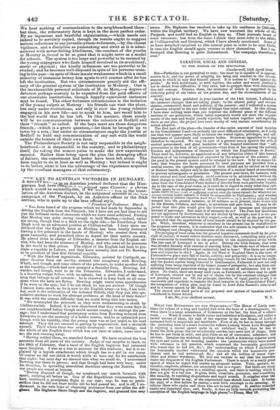TAXATION, LOCAL AND GENERAL.
TO THE EDITOR OF THE SPECTATOR.
Camberwell, 24th April 1849. $m—Perfection is not permitted to man: the most he is capable of is approxi- mation to it, and the power of adapting his being and conduct to the drum. stances in which he may find himself placed. It is useless to " kick against the pricks." As with individuals, so with nations the safest and wisest conduct is not to shrink from difficulties if they exist, but to grapple them with determina- tion and courage. Truisms these, the utterance of which is suggested by the tinkering policy of our rulers at the present day, and the circumstances of the country. In my last letter, published in your number of the 14th instant, I alluded to the immense changes that are taking place; to the altered policy and circum- stances, commercial, fiscal, and political, of the country; and I indicated a system of taxation adapted to the new order of things that must subsist. In this scheme I have done nothing more than put together the different plans of the different sections of our politicians, which taken separately would not meet the require. ments of the case and would justify rejection, but taken together and regarding them as one plan, the project does seem worthy of very mature consideration for actual adoption. The first part of the plan—the transfer of the entire amount of local taxation to the Consolidated Fund—is probably the most difficult of attainment, as it is the one that will appear most likely to invade the vested rights, privileges, and self- importance of individuals and corporate bodies. Strenuous opposition to it may therefore be expected. We may be sure of a general outcry against the evils of central government, and great laudation of the boasted sentiment that " self- government is the best of all government—that from it has sprung the political freedom and independence of character by which the Englishman is known." There need be, however, no apprehension of any infraction either of this boasted freedom or of his independence of character by the adoption of the scheme. All the good in the present system could be retained in the new. It by no means fol- lows, that because the funds necessary for local purposes are provided from* central source, the specific application of them should not be carried on by local or distinct boards, subject only to the supervision of a central board or commission to prevent extravagance or peculation. The present poor-laws, 'for instance, with their central and local machinery, could continue to be administered without the least change in their working; the only difference need be, that the money should come from the Consolidated Fund instead of directly from each particular locality. As in the case of the poor-rates, so it could be in regard to every other local rate. There weds be no displacement of local management or administration: neither needs tnere oe .ffiejent, cootrel over; he taxes raised; for whatever su- preme central board existed, it would be rponSible to Parliament; and whether the amount of general taxation were on v•. 70 caalinne, as it would he with the local merged into the general taxation, or 50 millions as at present, there would still be the Humes, Cobdene, and others, to scrutinize and pare down. It may be ob- jected that this plan would give the Government an immense and dangerous amount of patronage. But must it of necessity do so? The Poor-law Guardians are not appointed by Government, but are elected by the people; and it is not pro- posed to make any alteration in that respect,—in all as well as the, poor-rate, it is intended that the appointment of local boards should be by election by the peo- ple. While, therefore, whatever is excellent in the present can be transferred to the proposed new system, it is contended that the new system is required to meet the changed and changing circumstances of the country. The merging of local rates into the general taxation commends itself by its prin- ciple of justice; it would relieve districts most distressed, compelling each part of the community to contribute its due proportion to the maintenance of the whole. The late case of Liverpool is one in point. During the Irish famine, that town was invaded literally with swarms of starving Irish; the whole cost of whose sup- port the inhabitants of Liverpool exclusively had to bear! Was there not unfair- ness and injustice in this? Again, in the West of England there is the town of Falmouth—a place once full of bustle, activity, and prosperity: it is so no longer. In consequence of substituting steam for sailing-vessels for the transit of the mails, and the packet station being removed to Southampton, Falmouth is now not only suffering from being deprived of its former means of prosperity, but also from con- siderably increased pauperism eating into the remnant of subsistence left to the place. No doubt, there are many such cases as Falmouth, as there may be again of Liverpool, created not by any act of theirs, bat by the constant changes that are passing around us. On the principle, therefore, of equal justice to all, it is reasonable and expedient to transfer the local taxation to the Consolidated Fund; the recognition of which plan may be found in Lord John Russell's rate-in-aid and in a recent speech by Mr. Disraeli. The second and third parts of the proposed new system of taxation shall be considered in future letters.


























 Previous page
Previous page